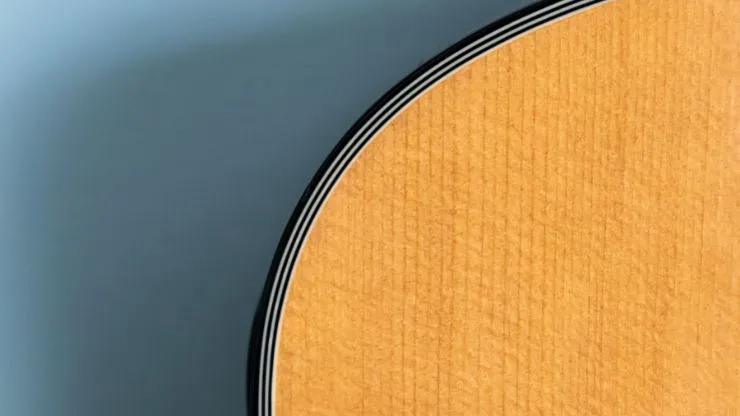What Is Spruce?
A spruce is a type of tree that belongs to the Picea genus and is native across the northern temperate and boreal regions. Besides being a popular option for Christmas trees worldwide, It produces a softwood that various industries, including construction, paper, and of course, musical instruments, have widely used.
Luthiers commonly use several different varieties in guitar construction, including Sitka, Norway, Red, White, and Engelmann.
Why Is Spruce a Good Guitar Tonewood?
Thanks to its excellent clarity and projection, many guitar makers regard spruce as one of the best choices, or even the perfect choice, for acoustic soundboards. While relatively simple in appearance, spruce still tends to have an attractive creamy white colouring that gives guitars a classic look. Additionally, the wood’s excellent sustainability means it is a cost-effective and sustainable choice.
How Is Spruce Used in Guitars?
Spruce is one of the most used tonewoods for acoustic guitars, where its excellent projection, relative strength, and lightness make it an ideal choice for guitar tops. It’s also a good choice for hollow-body electrics and semi-acoustics or as a top for solid body electric guitars. Full spruce solid body guitars are rare, however. And while spruce is strong enough to make a good soundboard, it’s far too weak to be an option for guitar necks and fretboards.
How Do Spruce Guitars Sound?
Spruce’s tone can vary a little depending on the variety of spruce used, but they all tend to offer a good, dynamic range, pleasing warmth, and excellent projection. It also provides good clarity, meaning it serves adequately for both strumming and picking. Additionally, Spruce guitars tend to have pleasant bell-like highs, with more brightness than cedar, while retaining full lows and a solid mid-range.
Are Spruce Guitars Durable?
The relative strength of spruce can differ between varieties. Janka hardness scores, for instance, are anywhere from 510 for Sitka spruce, which boasts an excellent stiffness-to-weight ratio, down to a very soft 380 for Norway spruce. That said, when used as a guitar top, spruce is more than capable of putting up with regular use year after year, but it’s wise to keep it protected when not in use.
Spruce Guitar Maintenance
As spruce is so commonly used on acoustic guitars, it’s likely that any guitar maintenance tips you’ve previously read were probably written with spruce in mind! You can keep your instrument singing loud and proud for many years by following these simple steps:
-
Keep your guitar at a stable temperature and humidity
-
Clean it with a good quality polish that suits your finish
-
Dust with a non-abrasive (ideally microfibre) cloth
-
Store your guitar in a padded case whenever you aren’t strumming
For added protection, you can also consider applying wax to your guitar body, and be sure to change your strings every 2-4 months, depending on how much you’ve been playing.
Is Spruce Sustainable?
Thanks to its wide distribution and fast growth rate, spruce is a very sustainable wood with no concerns for its future. It isn’t listed in the CITES Appendices, while the IUCN Red List considers all commonly used spruce species to be of the least concern.
What Are the Pros and Cons of Spruce Guitars?
| Pros | Cons |
|---|---|
| Excellent projection | Softer and less durable than most other options |
| Great clarity | Less warmth and resonance than options such as mahogany |
| Well-rounded tone, with bell-like highs, solid lows and a good mid-range | |
| Pleasing warmth | |
| Very sustainable | |
| Lightweight |
Spruce Tonewood Alternatives
For a similar sound but with more warmth, consider cedar, or for a solid mid-range performance, mahogany is the way to go. It’s also worth considering different varieties of spruce, as they all can have subtle changes that could just be what you’re looking for. For instance, Norway spruce tends to be warmer sounding than other spruces, while Engelmann spruce suits guitarists who favour a strong attack.
Finding Your Spruce Guitar
If spruce sounds like the tonewood for you, then why not visit our Finder tool? Select your requirements, including body type, budget, and wood, and start hunting for your perfect spruce guitar.

